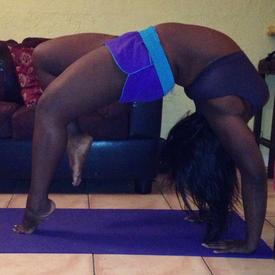Teach your children well

DrowningMermaid
Posts: 143 Member
Today I was thinking about the topic of teaching your children. My daughter was never taught skin tone differences. She was raised with all skin tones around her and was never told there's a difference. Yet she calls my BIL (her uncle) as well as her boyfriend "brownskins". She doesn't say it in a mean way, just as a matter of fact. "He's a brownskin". I don't know why this bothers me so much, but it does. And yet I don't know what the right way to change her words would be. Is "black" any better than "brown" really? I'm not a very politically correct person and I generally don't say "African American" which is only one reason it was never brought up.
Additionally, we have special needs and handicapped members in our family. When she was younger my daughter would see them and say "What happened to her?" or "Why does his face look like that?" or maybe the worst of them all "What's WRONG with them?"
How did you teach your children the right way to act around people who are different from them?
My daughter knows now about not speaking badly about someone with physical handicaps or anything, but there's still that issue of the skintone.
Additionally, we have special needs and handicapped members in our family. When she was younger my daughter would see them and say "What happened to her?" or "Why does his face look like that?" or maybe the worst of them all "What's WRONG with them?"
How did you teach your children the right way to act around people who are different from them?
My daughter knows now about not speaking badly about someone with physical handicaps or anything, but there's still that issue of the skintone.
0
Replies
-
I'm going to assume that your daughter is in her early teens or so since she's got a boyfriend. But why is it so wrong for her to recognize that people have different skin colours? It is what it is.0
-
Let me tell ya.. if you figure it out let me know.. the best way I have gone about it is that I told them that inside we are all exactly the same.. blood, bones, muscle, but the outside is different because the world would be very very boring if we all looked the same. The most reaction I have gotten out of them is .. hey theres someone who is pretty because theyre different.. which makes me proud.. there are those moments when they ask or wonder.. I have just tried to get them to ask me quietly or when we are home alone.
Not much help, but its what I did :ohwell:0 -
I'm going to assume that your daughter is in her early teens or so since she's got a boyfriend. But why is it so wrong for her to recognize that people have different skin colours? It is what it is.
No, she's 7. Her boyfriend is more a "boy friend" since Pre-K. I don't think it's wrong for her to recognize skin color, I just don't know if it's going to offend someone if she calls them brown, ya know? I don't want her to be offensive.0 -
She's old enough to have a boyfriend, but still doesn't know what the different races are?Yet she calls my BIL (her uncle) as well as her boyfriend "brownskins". And yet I don't know what the right way to change her words would be. Is "black" any better than "brown" really? I'm not a very politically correct person and I generally don't say "African American" which is only one reason it was never brought up.
Lead by example. You treat all people the same. When my children would stare or ask questions in regards to people who looked different (which is normal for children), we would explain to them why they shouldn't do that. Then explain what the differences are. [/quote]How did you teach your children the right way to act around people who are different from them?0 -
I don’t have children, but my little sister is 12 years younger than me. I remember when she was little she used to call Caucasian people peach or beige because that was the color she used for them when drawing. She called me chocolate because of my dark skin and called herself light brown because she is more fair skin. One day she came home from school and asked me what a Black person was. It was hilarious to me, but then I realized she had never been taught the differences between races. She had always assumed you were the crayon she used to color you in her pictures, and since she never used black to color anyone in she didn’t understand why someone had called her black. We basically explained to her that people come in all different colors and are from different backgrounds. Until that time she never knew, isn’t that amazing! This proves that people are not born racist, it is a learned behavior.
On another note my little brother who is 14 years younger than me came home crying after school (he was in 1st grade at the time) upset because his best friend who was white said “I don’t want to sit by you because your black.” His friend’s parents, who were really close with my parents, called and apologized. They explained that since their son made friends with a new kid in the neighborhood they noticed he had begun to point out skin color in other people. It turned out that the new friends family were racist and taught their child that behavior which he was passing on to other children.
This is why it is important to educate your child on race. Having a recognition of different skin tones is not a problem A basic explanation would do if they are young, but I’m sure with age more questions may arise. We have never made it a big deal in our family, but growing up in the suburbs and going to private schools I was usually one of a handful of ethnic people. I never felt like an outcast, nor did I separate myself from others because of their skin tone. I always looked at everyone as equals.0 -
First, teach her that there ARE differences. You aren't doing anyone a favor by pretending we're all the same.
Teach her that even though everyone is different, it's important to treat everyone with respect and courtesy no matter what they look like.
Teach her to keep her mouth shut until she's alone with an adult she trusts if she has a question about a person or how they look. Just tell her that asking in front of the person can make them feel bad. Then give her an honest answer.
And for God's sake, why are you encouraging her "boyfriend" situation at 7? I get that it's a friend thing, but you calling him her "boyfriend" is encouraging a relationship.0 -
I understand how it can be a difficult topic.
My son is 9 now but this is a conversation we had a while back. He had a real hard time understanding how someone could be called white, black, yellow or red. He told me that it makes ABSOLUTELY no sense... black people are not black: "Mom, they are all different but wonderful shades of brown." Yellow?!: "Mom, I have never seen a yellow person in my life! Asian people are the same color as us, just a little bit different" Red? "You mean like when someone gets MAD? The Indians are not and never were RED SKINS. They are just like us with a tan!" and White... my favorite... "I don't like it when people call me white." Me: "You don't?" Him: "No, because I am not. In the winter I am kind of pink, in the summer I am tan, besides that I'm like that apricot color in the crayon box"
How in the world do you argue with logic like that?
(Oh! and this all stems from a conversation about his wrestlers-toys. He was telling me how since he didn't have a Mark Henry he was going to use a construction worker (white muscled one) because after all... they looked exactly the same!)
As far as teaching her... you just do your best to let her know that we are all different but all the same inside. Sounds like you are doing a fine job just in caring enough to care! :flowerforyou:0 -
I don’t have children, but my little sister is 12 years younger than me. I remember when she was little she used to call Caucasian people peach or beige because that was the color she used for them when drawing. She called me chocolate because of my dark skin and called herself light brown because she is more fair skin. One day she came home from school and asked me what a Black person was. It was hilarious to me, but then I realized she had never been taught the differences between races. She had always assumed you were the crayon she used to color you in her pictures, and since she never used black to color anyone in she didn’t understand why someone had called her black. We basically explained to her that people come in all different colors and are from different backgrounds. Until that time she never knew, isn’t that amazing! This proves that people are not born racist, it is a learned behavior.
On another note my little brother who is 14 years younger than me came home crying after school (he was in 1st grade at the time) upset because his best friend who was white said “I don’t want to sit by you because your black.” His friend’s parents, who were really close with my parents, called and apologized. They explained that since their son made friends with a new kid in the neighborhood they noticed he had begun to point out skin color in other people. It turned out that the new friends family were racist and taught their child that behavior which he was passing on to other children.
This is why it is important to educate your child on race. Having a recognition of different skin tones is not a problem A basic explanation would do if they are young, but I’m sure with age more questions may arise. We have never made it a big deal in our family, but growing up in the suburbs and going to private schools I was usually one of a handful of ethnic people. I never felt like an outcast, nor did I separate myself from others because of their skin tone. I always looked at everyone as equals.
I was writing and didn't see this until after! I love that other kids use the same kind of logic as mine does in regards to your first paragraph!0 -
I was writing and didn't see this until after! I love that other kids use the same kind of logic as mine does in regards to your first paragraph!
Lol, yes I seen your post too and thought the same thing. 0
0 -
It also should be noted that the OP and I do live in a small rural town of 3000, with MAYBE 40 black residents. Very nice town that has actually never had a problem with racism or anything, but not a lot of people move in or out of this town. It is weird. Anywho...
I don't think there is really any way to "teach" your children how to properly behave towards others, other than by being an example. I have many friends of different ethnicity, and I could tell you right now that they (at least the black people I know) don't mind being called black or whatever they are.... However one thing we have always taught Carleigh (by example) is not to refer to people by their skin color or physical appearance if the situation does not warrant a description.
Example: We are in a crowd of 15 people. One guy is Asian. Everyone else is black or white. The Asian guy is wearing an obnoxious shirt that is HILARIOUS! I would not say to Adam "Hey look at the Asian guy with the funny shirt". I would just say "Hey, look at the guy with the funny shirt". I just don't feel the need to point out that he is Asian.
I wouldn't say that is a race/physical appearance/disability thing with us, we have just never seen people for anything other than "people".
Now, if we were at home and I said to Adam "Hey did, you see that guy with the funny shirt on?" and he said "Which one?" I would say "The Asian guy" to further my description...or the overweight/guy with one arm/black/or whatever guy...whichever fits the description.
Am I rambling??? Oh, I never make any sense... :ohwell:0 -
I see nothing wrong with being observant enough to notice a person's race. Knowing the slight differences between them saves people from making a blunder (I.E.: a Pakistani vs. Indian) in a social setting. If my son (4) points out a different coloured person than us, I say, "Yes, there are lots of different coloured people in the whole world. And different colours for eyes and hair, and short and tall people. Isn't it cool?"
As for disabilities, if we see someone in a wheelchair and he asks about it, I compare it to my needing to wear glasses to see better. I don't make them an object of pity, because it's ridiculous how others talk down to special needs people. Keeping the tone neutral and saying something positive goes a long way. "I bet his chair goes super fast!"0
This discussion has been closed.
Categories
- All Categories
- 1.4M Health, Wellness and Goals
- 397K Introduce Yourself
- 44.2K Getting Started
- 260.9K Health and Weight Loss
- 176.3K Food and Nutrition
- 47.6K Recipes
- 232.8K Fitness and Exercise
- 456 Sleep, Mindfulness and Overall Wellness
- 6.5K Goal: Maintaining Weight
- 8.7K Goal: Gaining Weight and Body Building
- 153.3K Motivation and Support
- 8.3K Challenges
- 1.3K Debate Club
- 96.5K Chit-Chat
- 2.6K Fun and Games
- 4.6K MyFitnessPal Information
- 16 News and Announcements
- 18 MyFitnessPal Academy
- 1.4K Feature Suggestions and Ideas
- 3.1K MyFitnessPal Tech Support Questions






